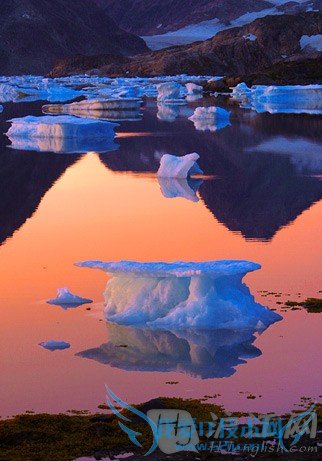ª∂”≠ƒ˙∑√Œ 52ij”¢∫∫ª•“ÎÕ¯£¨ΩÒÃÏ–°±ýŒ™ƒ„∑÷œÌµƒ”¢”Ô÷™ ∂ «£∫°æ°æ◊ÈÕº°ø2009ƒÍ»´«Ú Æ¥Ûª∑æ≥°∞±≠æþ°±°ø£¨œ¬√Ê «œÍœ∏µƒ∑÷œÌ£°
°æ◊ÈÕº°ø2009ƒÍ»´«Ú Æ¥Ûª∑æ≥°∞±≠æþ°±

Global Warming Not Going Gently »´«Ú±‰≈Ø≥÷–¯∂ÒªØ
2009 saw vast patches of the planet protected and world leaders pledge to fight global warming, but the climate continued to change dramatically--putting it in the "loss" column for the environment this year, according to experts who spoke to National Geographic. (Also see "Ten Environmental Wins of 2009.")
Joshua Reichert, managing director of the Pew Environment Group in Washington, D.C., said the "overarching problem of climate" is one of many environmental challenges that have worsened.
Conservationist Stuart Pimm added, "This isn't just some gentle sort of warming process, we are in major ways disrupting the climate. The debates now on climate change are whether the consensus is too mild. Many people think the Antarctic and Arctic ice is melting a lot faster than the consensus.
"I think global warming would probably be my pick for the gloomiest story" of 2009, added Pimm, a conservation biologist at Duke University.
--By John Roach
°™Photograph by John McConnico, AP

Oceans Begin to Lose Appetite for Carbon ∫£—ÛŒ¸ ’∂˛—ıªØúƒÐ¡¶ΩµµÕ
As the world's greenhouse gas emissions continued to rise this year and further disrupt the global climate, the oceans appeared to lose some of their appetite to absorb carbon dioxide, a key gas implicated in the planet's warming, according to a November study.
The study spanned the years between 2000 and 2007. In that time the amount of carbon from human activity absorbed by the oceans fell from 27 to 24 percent. Why the oceans are less hungry for carbon is unclear, but it may be related to the acidification of the oceans due to too much carbon, according to the study, led by Samar Khatiwala, an oceanographer at Columbia University's Lamont-Doherty Earth Observatory.
°™Photograph by Irwin Fedriansyah, AP
- ∆¿¬€¡–±Ì£®Õ¯”—∆¿¬€Ωˆπ©Õ¯”—±Ì¥Ô∏ˆ»Àø¥∑®£¨≤¢≤ª±Ì√˜±æ’æÕ¨“‚∆‰π€µ„ªÚ÷§ µ∆‰√Ë ˆ£©
-
